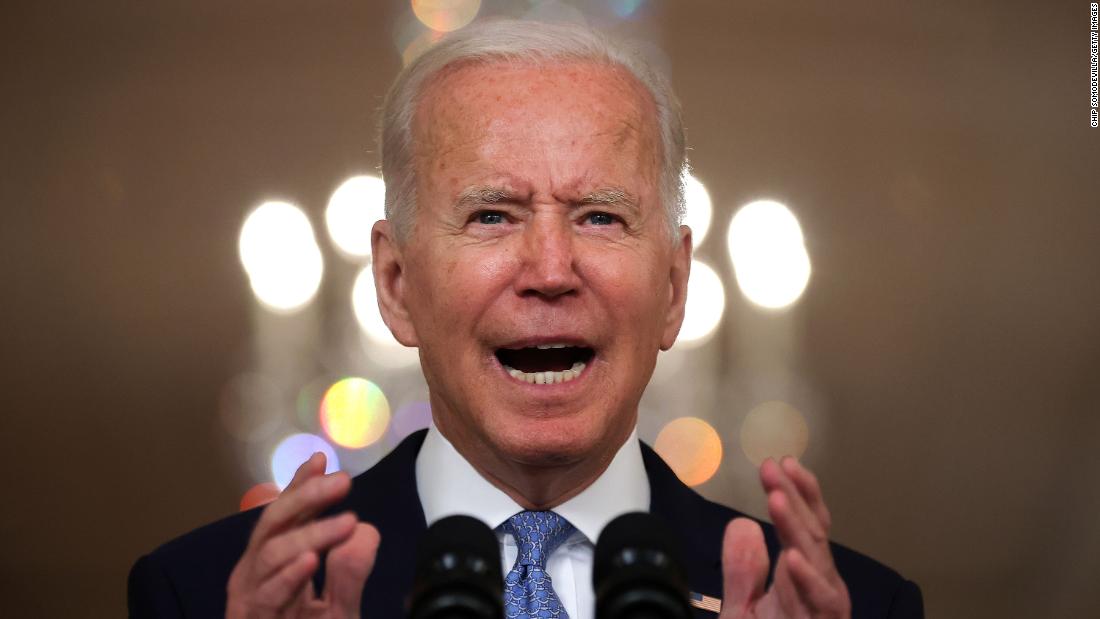“You all did a helluva job,” Biden told his top national security aides, according to a White House official. He feels the same way about his own performance.
They have eroded his political strength and stalled momentum for his economic agenda at home. Biden responded with heat of his own.
He has heard, and rejected, all the principal indictments. Publicly and privately, he and his aides dismiss the charge that they neglected fundamentally better alternatives for ending America’s longest war.
They acknowledge failing to anticipate the lightning collapse of the Afghan government and security forces as the Taliban advanced amid US troop withdrawals. But even if they had anticipated it, they say potential options — starting mass evacuations earlier, or handing the country to the Taliban directly — would have produced the same chaotic rush for the exits.
Biden broke a mid-August vow to keep troops at Kabul’s airport until all 6,000 Americans left in Afghanistan got out. But that was before the suicide bomb attack that killed 13 US troops and scores of others.
Approaching the August 31 deadline, the military had evacuated all but 100 to 200 citizens, many of them still ambivalent about leaving. The President chose what a different White House aide called “the best chance to save the most lives” by removing troops on schedule and relying on diplomatic pressure to help remaining Americans get out.
Biden’s belief that war in the oft-described “graveyard of empires” no longer served US interests hardened through years of quagmire. As vice president in 2009, he watched Barack Obama wrestle with his own skepticism as military leaders urged him to send more troops in a demonstration of American resolve.
“‘What does that mean, exactly,’ I’d ask, sometimes too sharply,” the ex-President recalled in his recently-published memoir. “That we keep doubling down on bad decisions we’ve already made? Does anyone think that spinning our wheels in Afghanistan for another 10 years will impress our allies and strike fear in our enemies?”
“Don’t let them jam you,” he said Biden told him.
The then-vice president lost that internal argument. In the Oval Office himself 12 years later, he resolved not to get jammed.
‘That’s political leadership’
The fact that most Americans told pollsters they favored leaving didn’t make it easy for Biden to accomplish on his watch. Public attention had long since moved elsewhere. Wars reach ragged conclusions.
“Much tougher than kicking the can down the road,” observed Michael Beschloss, one of several historians the President brought in for conversation six months ago. “Biden knows enough about history to know that he will expose himself to criticism for everything that happens. It took guts.”
“That’s political leadership, from my point of view,” Beschloss concluded. Nor have the hazards passed; Taliban reprisals against remaining Americans and Afghan allies, or other conspicuous abuses of human rights, would compound the damage he has already sustained.
For better or worse, Biden’s belief that he took risks for the national interest has brought out some signature qualities. His temper can flare quickly. The University of Delaware graduate has long bridled at those — from Republican adversaries to Obama White House aides to Obama himself — who mocked him as an intellectual lightweight or blowhard prone to verbal stumbles.
“In a milieu of Rhodes Scholars and former professors, he is thin-skinned about condescension, real and imagined,” Biden biographer Evan Osnos wrote last year. One antagonist in the 2009 Afghanistan debate, former Defense Secretary Robert Gates, later called him “wrong on nearly every major foreign policy and national security issue over the past four decades.”
Convinced he’s right now, Biden shouted his rebuttal in his speech to the nation after the troop withdrawal concluded. If even some allies found him counter-productively angry and defensive, he didn’t mind.
When Biden left the State Dining Room following his remarks, he heard from a member of his staff that television commentators called him “defiant.” It made the President smile.
“He just chuckled and said, ‘I just told what I think and what I believe,’ ” the White House aide remembered. “He’s defiant of the demand that he admit he was wrong. He does not believe he was wrong.”






More News
NYU Nurse Is Fired After Calling the Gaza War a ‘Genocide’ in Speech
Here Comes Manhattanhenge 2024: When and Where to Watch
Man Charged With Hate Crimes in New York City Street Attacks